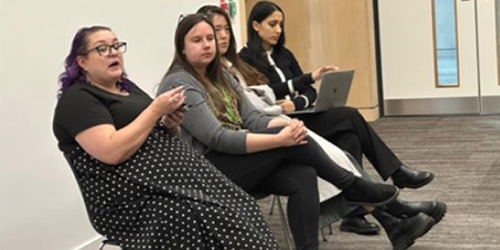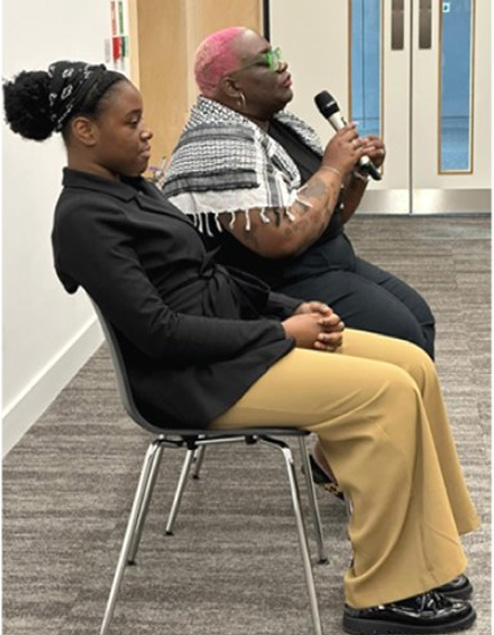Student Blog: Creative methods and law

PhD student and "songwriting-as-method" project researcher shares insights on creative methodologies at law conference.
Author: Nysha Givans, Institute of Education
On Thursday 5 June 2025, the West Midlands Legal Doctoral Network (WMLD) Summer PhD Conference, with the Law Research Centre Showcase, took place at the University of Wolverhampton’s Springfield Campus, hosted by Dr Metka Potočnik, Senior Lecturer in Law and Co-Head of the Law Research Centre.
The event featured a range of presentations from senior lecturers and doctoral researchers across various institutions, including poster submissions from Aston Law School. WMLDN is a network of WLV, Birmingham City University, Aston University, Coventry University, Warwick University and Birmingham University.
For someone outside the legal field, it was a valuable opportunity to witness interdisciplinary research in action and engage with academics from diverse backgrounds.
Notably, the event facilitated strong cross-institutional collaboration, offering researchers space to connect and reflect on their work with lecturers and emeritus professor. The day concluded with a dynamic and inspiring keynote from Professor Peter Walton whose talk was both thought-provoking and highly engaging.

Why attend as a non-law student?
I was invited to take part on a panel discussion at the conference alongside Rejoice Abudar in our capacity as research assistants on the SAM Project – “Songwriting-as-method” in Business and Law. This innovative project is led by Dr Metka Potočnik (also the Lead of the Gender in Music Research Hub with The F-List for Music CIC) in collaboration with Dr Joanna Collinson Scott (University of the West of Scotland).
Creative methodologies such as songwriting are seldom used in legal or business research, making this project particularly unique. Songwriting as a research activity was initially piloted during Workstream 3 (WS3) of the That's Me Project, a partnership between the University of Wolverhampton and Birmingham City University. In that project, I served as a student co-creator and storyteller under Dr Potočnik’s leadership. WS3 tested the viability of songwriting as a research tool - WS3 resulted in 6 songs, and the EP “Feathers.”
One of the most rewarding moments at the conference was sharing some of the songs created during WS3. These songs, written by the storytellers with guidance from the songwriters and were mastered by Joseph Geoghan (University of Wolverhampton’s School of Film and Media), were developed strictly for non-commercial purposes. They emerged not as commercial ventures but as healing, expressive outputs—transforming personal narratives into lyrical forms.
The songwriting process was grounded in co-creation and safety. Under the guidance of professional songwriters, participants were encouraged to speak openly in a judgement-free environment. This was particularly meaningful to me as someone who identifies as part of the Global Majority. My voice, often marginalised in traditional academic spaces, was not only heard but valued.
During the conference, Rejoice and I shared reflective accounts of our experiences in the That’s Me Project. Our discussions supported Dr Potočnik’s broader discussion on the potential integration of practice research methods within legal education and creative methods—especially those rooted in storytelling and cultural practice—are often dismissed in traditional academic settings. Yet, they offer rich, layered data and enable authentic participation. As Griffiths (2007) highlights, research should “change the way people act, the way they use available knowledge.” Songwriting allows this by offering inclusive, accessible, and emotionally resonant forms of data collection and dissemination.
Further, as Palmer (2016) explains, transdisciplinary research can effectively integrate knowledge from across disciplines. Songwriting could do just that—it bridges law, business, ethnography, and the arts. It enables researchers to work with participants rather than simply on them, empowering voices that are too often sidelined.
Storytelling is deeply embedded in the cultures of many Global Majority communities. Growing up in a Jamaican household, stories like Anansi the Spider played a key role in how I learned, communicated, and understood the world. Incorporating such traditions into academic research not only preserves this cultural legacy but also challenges the exclusivity of conventional methodologies.
Songwriting as a method is more than an alternative to interviews or surveys—it is a tool for empowerment, healing, and truth-telling. It helps ensure research is not extractive but inclusive, with outcomes that are meaningful both academically and personally.
The WMLD Conference was an enriching experience that affirmed the value of creative and collaborative research. It provided a platform to promote new methods, amplify underrepresented voices, and explore how the arts could serve as a powerful vehicle for knowledge production in law and business.
For more information please contact the Corporate Communications Team.


/prod01/wlvacuk/media/departments/digital-content-and-communications/submitted-news-images/Smelting-knife.png)
/prod01/wlvacuk/media/departments/digital-content-and-communications/images-2024/250630-SciFest-1-group-photo-resized-800x450.png)
/prod01/wlvacuk/media/departments/digital-content-and-communications/images/stock-images/WLV-email-header-banner---City-courtyard---Opportunity-teaser.png)
/prod01/wlvacuk/media/departments/digital-content-and-communications/images-2024/Arthi-Arunasalam-teaser.jpg)
/prod01/wlvacuk/media/departments/digital-content-and-communications/web-images-and-banners/Birmingham-City-womens-U21-squad.jpeg)
/prod01/wlvacuk/media/departments/digital-content-and-communications/submitted-news-images/Business-School-800x450.jpg)
/prod01/wlvacuk/media/departments/digital-content-and-communications/images-2024/240920-Forensic-Science-Resized.jpg)